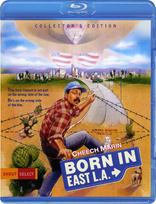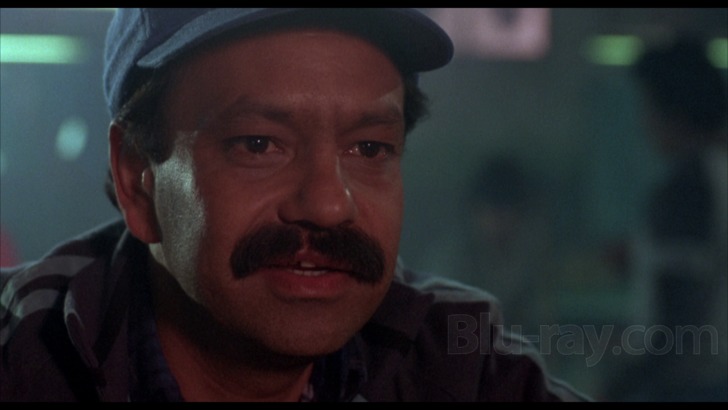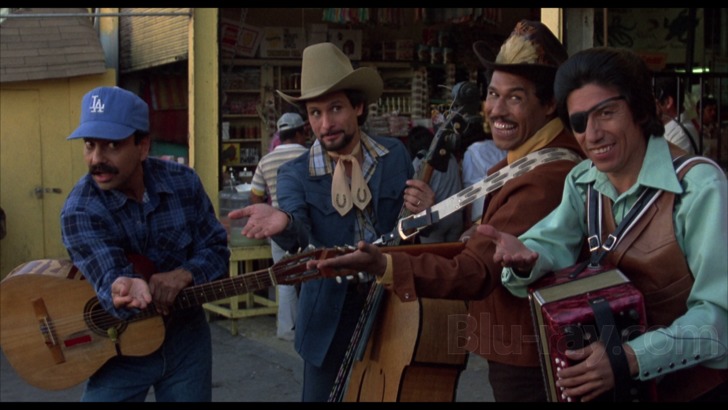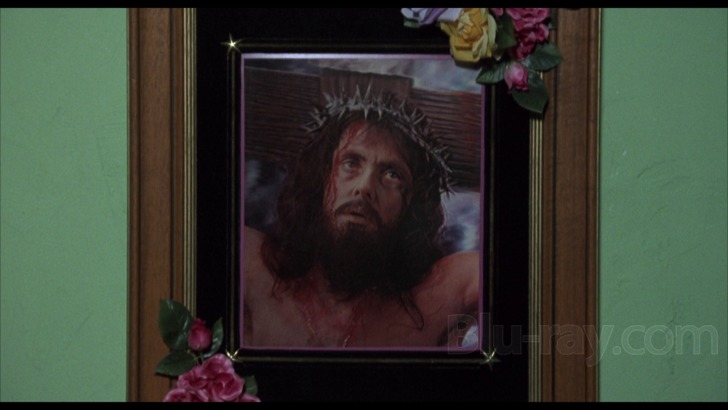Born in East L.A. Blu-ray Movie
HomeBorn in East L.A. Blu-ray Movie 
Collector's EditionShout Factory | 1987 | 84 min | Rated R | Mar 19, 2019

Movie rating
6.8 | / 10 |
Blu-ray rating
| Users | 0.0 | |
| Reviewer | 4.0 | |
| Overall | 4.0 |
Overview
Born in East L.A. (1987)
When a native-born American citizen of Mexican descent is mistakenly deported to Mexico, he has to risk everything to get back home.
Starring: Cheech Marin, Paul Rodriguez, Daniel Stern, Kamala Lopez, Jan-Michael VincentDirector: Cheech Marin
| Comedy | 100% |
Specifications
Video
Video codec: MPEG-4 AVC
Video resolution: 1080p
Aspect ratio: 1.85:1
Original aspect ratio: 1.85:1
Audio
English: DTS-HD Master Audio 2.0 (48kHz, 24-bit)
BDInfo
Subtitles
English SDH
Discs
Blu-ray Disc
Single disc (1 BD)
Playback
Region A (locked)
Review
Rating summary
| Movie | 4.0 | |
| Video | 3.0 | |
| Audio | 4.0 | |
| Extras | 5.0 | |
| Overall | 4.0 |
Born in East L.A. Blu-ray Movie Review
Reviewed by Brian Orndorf March 15, 2019According to Cheech Marin, “Born in East L.A.” was put together in a hurry to complete a 1985 Cheech & Chong album without Tommy Chong. The tune was a hit, thanks to a popular video that visually sold the story of a California man accidentally deported by steely immigration officers. And that MTV-staple video inspired a movie, with Marin breaking away from Chong to mastermind a cinematic elongation of his original idea, creating 1987’s “Born in East L.A.” That’s quite a journey from initial inspiration to multiplexes, but Marin finds plenty of inspiration to fill up the run time, intending to blend commentary on immigration issues with broad bits of slapstick comedy, positioning himself as a Chaplin-type with this border-hopping adventure. Chong isn’t missed here, as Marin has something of a vision for his helming debut, trying to find the funny as much as possible without slipping into preachiness or melodrama.

Rudy (Cheech Marin) is a Los Angeles car mechanic just trying to pay the bills, left alone for the week as his family travels north to visit relatives. Forgetting his wallet at home, Rudy carries on as normal, tasked with picking up his cousin, Javier (Paul Rodriguez), who’s arrived fresh from Mexico, unable to speak English. When a toy factory meeting turned into an immigration raid, Rudy is captured with other illegals and sent to Mexico, unable to clarify his citizenship without his I.D. Stuck in Tijuana, Rudy finds employment from opportunist Jimmy (Daniel Stern) and kindness from Dolores (Kamala Lopez), a young woman from El Salvador. Working to collect enough cash to pay for a covert border crossing, Rudy begins to master life in Tijuana, growing close to Dolores while waiting for his family to return home and rescue him.
While Marin is dealing with the issue of illegal immigration, “Born in East L.A.” doesn’t warm up to the realism of the experience for quite some time. Introductions are actually made with typical Marin mischief, with the main titles tracking Rudy’s pursuit of a French model as she crosses town in heels, managing to stop traffic and destroy sunglasses with her beauty. It’s a strange sequence, but it offers a way for Marin to get the audience on his side, delivery goofiness to set the tone of “Born in East L.A.” It works, with the lightheartedness of the screenplay and performances carrying the picture far, with Marin most interested in completing gags, not concentrating on a plot, rendering the effort episodic, but not offensively so.
Javier has a subplot concerning his interactions with a lenticular picture of Jesus he believes is communicating with him, but the bulk of “Born in East L.A.” remains in Tijuana, watching Rudy try to earn enough money to find his way back to America after the loss of his I.D. He finds a boss in Jimmy, who uses Rudy as a doorman, luring customers into his bar, while other odd jobs earn him pennies on the dollar, increasing his frustration. Rudy finds himself entangled with gold-toothed jailhouse overlord Feo (Tony Plana), and falling for Dolores, who initially rejects his presence, only to witness his kindness when dealing with desperate locals trying to survive. Escape attempts are made, and Marin plays it all very broadly, imagining border runs as a football game between Mexicans and the immigration cops, and Rudy experiences several classic comedy situations of self-preservation and accidents, giving Marin a chance to pay tribute to the comedies of his youth.
Born in East L.A. Blu-ray Movie, Video Quality 

The AVC encoded image (1.85:1 aspect ratio) presentation looks to be an older scan of "Born in East L.A." Shout Factory makes an attempt to ease the processing of a Universal catalog title, but filtering is present, diminishing some level of detail. Textures aren't completely pulled out of facial surfaces and locations, and dimension is modest but there, finding life on hills and down Tijuana streets. Hues are acceptable, offering reasonable blues for costuming and Rudy's baseball cap, while Mexican nightlife delivers punch through signage and costuming. Skintones are natural. Delineation is acceptable. Source shows some wear and tear, especially during the opening reel, which endures speckle storms and a few jumpy frames.
Born in East L.A. Blu-ray Movie, Audio Quality 

The 2.0 DTS-HD MA sound mix provides a simple listening experience for "Born in East L.A." Dialogue exchanges are clear, supplying necessary intelligibility when it comes to various performance speeds and accents, clarifying jokes and emotion. Scoring isn't distinct, but sells the comedic mood of the feature. Soundtrack selections and street performances offer a little more energy, sold with adequate instrumentation. Atmospherics are basic, with street bustle appreciable.
Born in East L.A. Blu-ray Movie, Special Features and Extras 

- Commentary features writer/director/star Cheech Marin.
- "Waas Sappening?" (31:19, HD) is an interview with Marin, who tracks the inspiration for the original song that inspired the movie, which involved getting the parody rights from Bruce Springsteen for the tune, a music video, and the film. "Born in East L.A." experienced difficulty acquiring a greenlight, with the Universal head Frank Price booted from power due to the disastrous performance of "Howard the Duck," giving Marin only a brief window to get the material on film. Social messages are examined, woven into the writing, but humor was largely improvisational, permitting Marin to play to his strengths. Robert Altman was initially approached to direct, with Marin taking control without much experience, finding comfort in the editing process to put the feature together. Casting achievements are examined, while Marin's plans for a sequel were squashed by a gun-shy Universal. Marin discusses the screenplay's relevancy in today's world and the picture's enduring popularity, expressing satisfaction with the final product.
- "Who You Calling Stupid?" (13:36, HD) sits down with Paul Rodriguez, who shares his casting story, winning the part due to his ability to improv in Spanish. The interviewee highlights the fame the character has brought to him, embracing silliness while supporting the social significance of the feature. Rodriguez reinforces the importance of the movie, which touched on immigration issues that remain today, doing so with distinct American pride. Co-star camaraderie is noted and respect for Marin is shared, while the lasting legacy of "Born in East L.A." is examined.
- "What is a Disco Bunnies?" (14:25, HD) is a spirited chat with Kamala Lopez, who details her casting experience, confidently taking on models to win the part of Dolores. Character work is explored, with Lopez trying to instill some life into the role while trusting Marin to care for the central message of the movie. Preparation is shared, and Lopez is passionate in her assessment of Marin as a director, considering it a crime he never returned to the job. The interviewee has ideas on the nature of male behavior, and she gets emotional when recalling the production's impact on Latin communities and her career, which didn't take the direction she was expecting. Lopez closes with thoughts on the lasting message of the picture.
- Extended Television Cut (93:56, SD) presents a much lengthier version of "Born in East L.A." (sans R-rated material), with the bulk of additions displayed during the finale, which sends Rudy and Dolores through an entire kidnapping scheme with border gangsters (also welcoming the return of Jan-Michael Vincent's immigration cop character). The theatrical cut had the right idea to keep it short, but for fans of the movie, this addition is a great study in the value of editing and awareness of pace.
- Still Gallery (2:01) displays publicity snaps and BTS shots.
- And a Theatrical Trailer (1:27, SD) is included.
Born in East L.A. Blu-ray Movie, Overall Score and Recommendation 

The serious side of "Born in East L.A." isn't quite a defined as Marin believes. The message-minded aspects of the plot aren't lathered with outrage, as the picture is more invested in oddities than sermonizing (for example, Rudy is tasked with teaching a collection of "Chinese Indians" how to act like true L.A. residents). However, humanity is present, with the ending suddenly paying close attention to the true price of immigration laws and risk in the pursuit of an American residency. The writing offers a simplified understanding of border issues, but it's hard to press such a wacky film for authenticity. It's uneven, but "Born in East L.A." has a lot of funny business, with Marin providing wonderful commitment to the humor of the feature, often doing whatever he can to make his audience smile.
Similar titles
Similar titles you might also like

Up in Smoke
1978

Due Date
2010

The Fluffy Movie
Extended Edition
2014

Search Party
2014

The Six Wives of Henry Lefay
2009

Delta Farce
2007

Instructions Not Included
No se aceptan devoluciones
2013

We're the Millers
Extended Cut
2013

City Slickers
Collector's Edition
1991

Nacho Libre
2006

Ideal Home
2018

Overboard
2018

Just Getting Started
2017

Mexican Hayride
1948

Rat Race
2001

Here Comes the Boom
2012

My Fellow Americans
1996

The Heartbreak Kid
2007

Corporate Animals
2019

Grandma's Boy
2006